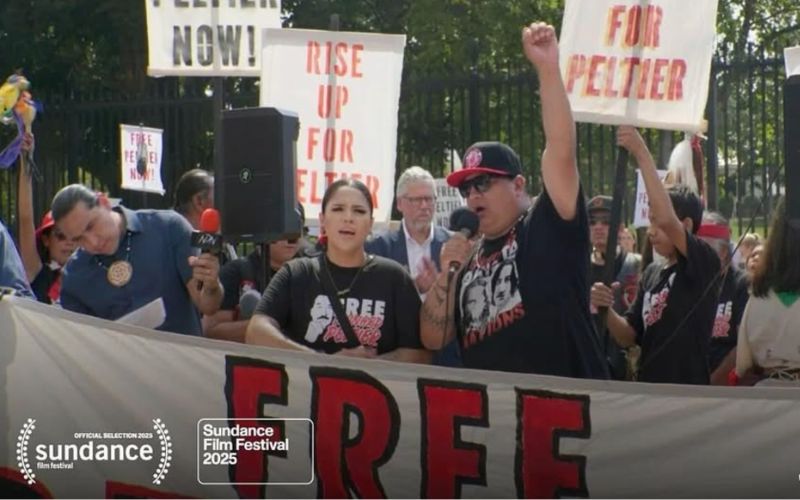
- Details
- By Kaili Berg
The Sundance Institute recently unveiled the lineup for the 2025 Sundance Film Festival, which will showcase 87 feature films and six episodic projects that promise daring storytelling and global perspectives.
Among the films in this year’s lineup are powerful portrayals of Indigenous experiences, including El Norte and Free Leonard Peltier.
Sundance Institute Senior Programmer Heidi Zwicker told Native News Online that the selection of films underscores diverse narratives in Native films.
“The films that we have this year indicate how much you can’t define what an Indigenous film should be like,” Zwicker said. “There’s such multiplicity in the stories and worlds these filmmakers present, even within a single community.”
The Festival will take place from January 23 to February 2, 2025, with screenings in Park City and Salt Lake City, Utah, as well as a curated online program accessible to audiences nationwide from January 30 to February 2.
Free Leonard Peltier, co-directed by Jesse Short Bull (Oglala Lakota) and David France, is a documentary that dives into the life and legacy of Leonard Peltier, a leader of the American Indian Movement who has been imprisoned for 50 years following a controversial conviction.
Zwicker described the film as “rich, well-researched, and deeply emotional,” emphasizing its timeliness as Peltier’s case gains renewed attention in the fight for clemency.
Gregory Nava’s El Norte follows Indigneous siblings Rosa and Enrique as they flee Guatemala after their family is murdered in a government-led massacre during the Guatemalan Civil War. Their journey to the U.S. becomes a struggle for survival amid the realities of immigrant life.
Profits from ticket sales directly support Sundance Institute’s year-round initiatives, including labs, residencies, fellowships, and educational programs through Sundance Collab. These programs empower thousands of artists annually.
Sundance’s Indigenous Program, led by Adam Piron (Kiowa/Mohawk), is a vital part of this mission, providing ongoing support to Native filmmakers.
“It’s a central part of our mission as an institute to uplift these artists,” Zwicker said.
In addition to the feature films, the 2025 Festival will present a wide array of short films, special talks, and immersive experiences. The annual fundraising gala, Celebrating Sundance Institute, presented by Google TV, will take place on January 24 at the Grand Hyatt Deer Valley.
The Sundance Film Festival Awards ceremony, recognizing outstanding achievements, will be held on January 31 in Park City.
The Festival will also highlight innovative works in science and technology, with the Alfred P. Sloan Feature Film Prize awarded to SALLY, a feature-length film screening in the Premieres category. The Short Film Program and a detailed schedule for the Festival will be announced later this month.
“Festivals play a crucial role in continuing to celebrate Indigenous voices and getting talented filmmakers more opportunities to share their work with audiences,” Zwicker said.
For audiences eager to engage with groundbreaking films and diverse perspectives, tickets for in-person and online screenings will go on sale on January 16 at 10 a.m. MT. Sundance Institute members will have early access to tickets, and a limited number of passes remain available.
More Stories Like This
Celebrating 50 Years: The Rockwell Museum Looks to the Future with "Native Now"AMC Announces Return of Dark Winds for Season 4, Premiering February 15
Film featuring Teyton Colbert to hit theaters in November
Tlingit Hunter and Artisan Heather Douville Shares Cultural Traditions in New MeatEater Series “Our Way of Life”
What Inspires Indigenous Ballet Dancer Jock Soto
Help us tell the stories that could save Native languages and food traditions
At a critical moment for Indian Country, Native News Online is embarking on our most ambitious reporting project yet: "Cultivating Culture," a three-year investigation into two forces shaping Native community survival—food sovereignty and language revitalization.
The devastating impact of COVID-19 accelerated the loss of Native elders and with them, irreplaceable cultural knowledge. Yet across tribal communities, innovative leaders are fighting back, reclaiming traditional food systems and breathing new life into Native languages. These aren't just cultural preservation efforts—they're powerful pathways to community health, healing, and resilience.
Our dedicated reporting team will spend three years documenting these stories through on-the-ground reporting in 18 tribal communities, producing over 200 in-depth stories, 18 podcast episodes, and multimedia content that amplifies Indigenous voices. We'll show policymakers, funders, and allies how cultural restoration directly impacts physical and mental wellness while celebrating successful models of sovereignty and self-determination.
This isn't corporate media parachuting into Indian Country for a quick story. This is sustained, relationship-based journalism by Native reporters who understand these communities. It's "Warrior Journalism"—fearless reporting that serves the 5.5 million readers who depend on us for news that mainstream media often ignores.
We need your help right now. While we've secured partial funding, we're still $450,000 short of our three-year budget. Our immediate goal is $25,000 this month to keep this critical work moving forward—funding reporter salaries, travel to remote communities, photography, and the deep reporting these stories deserve.
Every dollar directly supports Indigenous journalists telling Indigenous stories. Whether it's $5 or $50, your contribution ensures these vital narratives of resilience, innovation, and hope don't disappear into silence.
 The stakes couldn't be higher. Native languages are being lost at an alarming rate. Food insecurity plagues many tribal communities. But solutions are emerging, and these stories need to be told.
The stakes couldn't be higher. Native languages are being lost at an alarming rate. Food insecurity plagues many tribal communities. But solutions are emerging, and these stories need to be told.
Support independent Native journalism. Fund the stories that matter.
Levi Rickert (Potawatomi), Editor & Publisher

